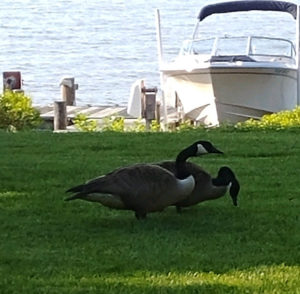Donor Spotlight – Charles & Mary Dankmeyer

George and Georgette were frequent visitors to the Dankmeyers’ yard on the Magothy River in Maryland.
For Charles and Mary Dankmeyer, soaking in the wonder of the Chesapeake is a daily joy. “We have a real fondness for the Chesapeake,” Charles said recently from the home along the Magothy River he shares with his wife, Mary. “When we started living here in 1975, people would walk on the shorelines with a wheeled soft crab basket and would just roll it along the bottom and pick up the soft shells! You could almost time when the weather would change by the thousands of swans that would visit in November. That is the wonderful thing about nature—you get to enjoy the beauty, the migratory birds, and harvest the bounty.” The couple describes a fellow Chesapeake pair for life, George and Georgette, mating Canada geese that visited them regularly, marking the passage of time before development began changing the coastline and the character of the Bay. “The swans are almost all gone, and there has been so much change. We really want to recover the Bay for future generations,” said Mary.
The couple first approached Chesapeake Conservancy to explore donating a property they owned on the Eastern Shore that had become a rookery for blue herons. Working with the Conservancy, they helped fully conserve the property and became avid supporters of the Conservancy’s work. “We have traveled to many different areas of the world, and the Chesapeake is as stunning as any other place we have ever experienced. Chesapeake Conservancy’s work is important to us, not to just conserve it but to make sure that more people can enjoy it,” Charles said. Earlier this spring, Charles and Mary decided to include Chesapeake Conservancy in their estate plans. They became members of the Seven Generations Society, named in honor of the Native American principle of making decisions mindful of seven generations to come. Charles and Mary join others who are taking long-term action to ensure this national treasure is protected and shared with future generations by including Chesapeake Conservancy in their estate planning. “When we are gone, what is going to do the most good? We have made a home with nature; we’ve enjoyed it. Now it is incumbent upon us to pass those treasures on to future generations.”